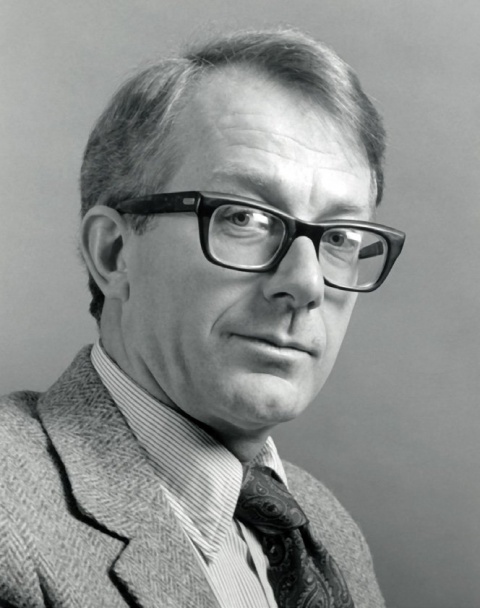Columbia College | Columbia University in the City of New York
In Memoriam: Peter R. Pouncey, Ninth Dean of the College, Was Instrumental in Its Move to Coeducation

Pouncey was one of the early leaders in Columbia’s revival from the turmoil of the Vietnam War era. He was a strong proponent of admitting women to the all-male College, a move he considered vital to that revival, and often clashed on that issue with the University’s more cautious central administration.
Possessed of a quick British wit and with a penchant for nicknames — “Pounce Dog” is the moniker he preferred for himself — Pouncey also was wary of technology, avoiding cellphones and approaching computers with caution. “They really do smell fear,” he once told an interviewer from The New York Times.
Pouncey was born in Qingdao, China, on October 1, 1937. His father was British commissioner of Chinese customs until the Communist revolution in 1948; his mother was half French and half British, born in Shanghai to parents who were silk merchants. During WWII, Pouncey’s mother took her three children to live in Vancouver while her husband remained in China. Following the war, the family reunited in England, where Pouncey attended boarding schools and earned a B.A. in classics in 1964 and an M.A. in 1967, both from Oxford.
After briefly training to become a Jesuit priest, Pouncey moved to New York to fill in for a professor on leave at Fordham. In 1969 he earned his Ph.D. in classics from Columbia and was appointed an assistant professor of Greek and Latin in the Classics Department.
It was a time of turmoil on many college campuses, including Columbia, where the Spring semesters in both 1968 and 1970 were abbreviated following widespread student protests over the Vietnam War and other issues. When Pouncey became dean of the College in 1972, he called himself “the cannon fodder dean” in reference to the upheaval on the Morningside campus.
Those challenges did not stop him from making his mark, especially with regard to coeducation. In 1975, Pouncey issued a report recommending the merger of the College, the School of General Studies, Barnard and the undergraduate division of Columbia Engineering into one dedicated undergraduate school for all Columbia students. Later that year he held a vote among College faculty on making the school coeducational, to the displeasure of President William J. McGill, who did not want to upset Barnard and thus rejected the proposal. However, that only delayed the decision; in December 1981, the University Trustees voted to make the College coeducational.
In 1976, Pouncey resigned as dean and returned to teaching in the Classics Department. His book The Necessities of War: A Study of Thucydides’ Pessimism was published in 1980 and a year later won the Lionel Trilling Book Award for best new book by a faculty member, as determined by a panel of College students. “My main man is Thucydides,” he told the Times. “He is very image conscious; he makes the reader attend, fix focus, slow up and see.”
In 1984, Pouncey left Columbia to become president of Amherst, which was undergoing turmoil of its own following the sudden death of its president, Julian Gibbs, and a decision to abolish the fraternity system, the main form of social life on the rural campus. Pouncey’s priorities were creating a robust post-fraternity social life on campus and attracting a more diverse student and faculty population. He thought Amherst needed to recruit students from different cultural and ethnic backgrounds, first-generation students and others who might not see themselves as a natural fit in order for the school to have “a full sample of the nation’s talent.”
In addition, he strongly encouraged interdisciplinary programs and breaking down barriers between departments and established both the Department of Sexuality, Women’s and Gender Studies and the Law, Jurisprudence and Social Thought Program. During his tenure, the endowment grew from $132 million to more than $320 million and a new student center, gymnasium and dormitory were built.
After Pouncey stepped down as president in 1994, he remained at Amherst as the Burnell-Forbes Professor of Greek until 1998, when he returned to Columbia to finish his teaching career as an adjunct at The Heyman Center for the Humanities and a member of the Society of Senior Scholars.
He published his only novel in 2005. On the day after Christmas 2003, Pouncey began to pull together the notes, musings and ruminations he had been keeping in a box since 1981. Seven weeks later, he had edited them into a 200-page manuscript version of Rules for Old Men Waiting, the story of Robert MacIver, whose life spans three wars and a 40-year marriage. The book won the McKitterick Prize in 2006 and was nominated for the Commonwealth Writers Prize the same year.
In 1985, Pouncey was presented the College’s highest honor, the Alexander Hamilton Medal, along with other former deans Lawrence H. Chamberlain, David B. Truman, Carl F. Hovde ’50 and Arnold R. Collery.
Pouncey is survived by his son, Christian (Victoria); daughter, Maggie ’00, SOA’08 (Matt Miller SEAS’00, SEAS’01); stepdaughter, Emily Liebert GSAS’13 (Vlad Kobzar); and five grandchildren.
— Alex Sachare ’71
A celebration of Pouncey’s life will be held at 5:00 p.m. on Friday, October 27, 2023, at St. Paul’s Chapel, 1160 Amsterdam Ave., New York, NY 10027. A reception will follow at Faculty House. RSVP by Friday, October 20, 2023. If you have a question, contact cc-events@columbia.edu. If you cannot attend the service, please consider signing the virtual guestbook, which will be shared with the family following the memorial.
Issue Contents
Published three times a year by Columbia College for alumni, students, faculty, parents and friends.
Columbia Alumni Center
622 W. 113th St., MC 4530, 6th Fl.
New York, NY 10025
212-851-7852
cct@columbia.edu
Columbia Alumni Center
622 W. 113th St., MC 4530, 4th Fl.
New York, NY 10025
212-851-7488
ccalumni@columbia.edu

